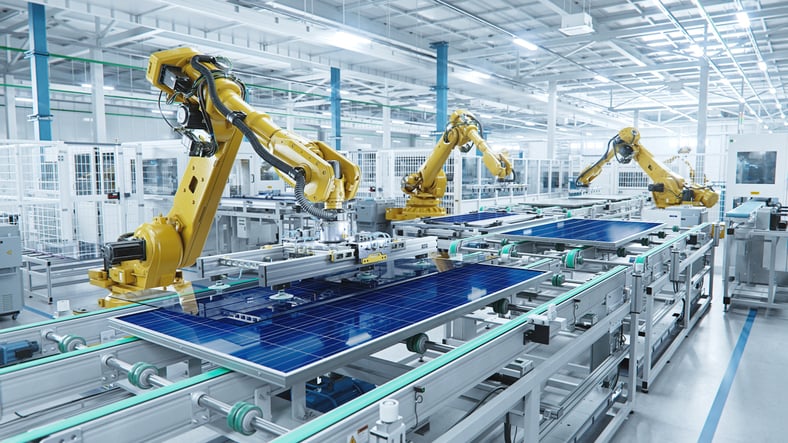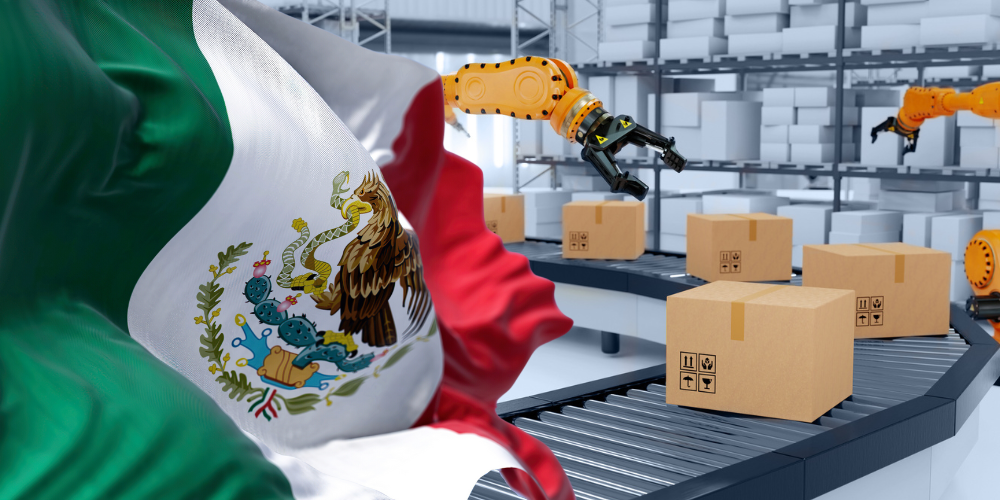As global markets evolve, Mexico has emerged as a key player in the manufacturing industry, offering a diverse range of opportunities for businesses. In this article, we explore the key industries, areas of innovation, major players, and economic factors contributing to Mexico's robust manufacturing landscape.
Key Factors Contributing to Mexico's Economic Growth
Mexico's economic growth can be attributed to several key factors. First, the establishment of free trade agreements with other countries has played a significant role. These agreements have facilitated increased trade between Mexico and various countries such as Japan, South Korea, Canada, the United States, and European nations. This boost in trade has bolstered Mexico's economy over the past three decades.
Additionally, foreign business investment has contributed to Mexico's economic growth. Companies from the above countries have shown interest in investing in Mexico, which has led to job creation and the development of industries. This influx of foreign investment has provided Mexico with additional capital and resources, enhancing its economic growth.
Mexico has emerged as an attractive business location due to the escalating trade and geo-political friction with China in recent years. Recent trade data shows that Mexico has exceeded China as the number one exporter to the USA. As companies seek alternative destinations for manufacturing and investment, Mexico has positioned itself as a favorable option. This renewed interest has brought about further economic growth, as relationships and partnerships are formed with international businesses.
It is important to note that Mexico's economy, like many others, experienced significant challenges during the Covid-19 outbreak. However, as businesses reopened and countries have returned to normal, Mexico's economy is growing. This recovery can be attributed to the disruption of trade between China and the US, higher tariffs when importing to the US from China, as well as the resurgence of trade and economic activities.
Innovation and Growth in Mexico's Manufacturing
Mexico's manufacturing industries are witnessing remarkable growth and a shift towards increased sophistication, thanks to the integration of automation technologies and the use of cutting-edge production machinery.
However, Mexico is not solely focused on traditional manufacturing; instead, it has positioned itself as a leading global hub for start-ups and technology-driven ventures. In this regard, several key sectors are experiencing significant innovation and growth. These include information technology (IT), where the country is making remarkable strides in developing advanced software, hardware, and digital solutions.
Furthermore, Mexico's fintech sector is flourishing with the emergence of innovative financial technologies and services. Logistics and e-commerce are also thriving as Mexico leverages digital platforms and supply chain technologies to enhance efficiency and connectivity. The country is actively promoting sustainable technology initiatives, fostering the growth of renewable energy, waste management, and environmental stewardship.
Additionally, agribusiness represents a promising area of innovation, with advancements in agricultural technologies, biotechnology, and sustainable farming practices.
Also, Mexico's mobility sector is witnessing remarkable progress, particularly in the development of electric vehicles, smart transportation systems, and urban mobility solutions. Through consistent investment in these key sectors, Mexico is positioning itself as a frontrunner in technological innovation within the manufacturing industry.
Key Industries for Manufacturing in Mexico
For businesses considering manufacturing in Mexico, understanding the key industries is crucial. Traditionally, automotive, aerospace, appliances, consumer electronics, and medical devices have thrived. All of these industries typically require a high level of labor content with zero defects. These industries are extremely well-established in Mexico, with many companies having years of experience with exporting to Europe, the US, Australia, and Canada.
In addition to the traditional industries, Mexico's manufacturing capabilities have expanded to encompass a wide range of sectors, such as food and beverages, apparel and textile manufacturing, furniture manufacturing, oil and gas, packaging, and consumer products. This means that Mexico can support manufacturing for many different types of products. With cost-competitive labor and access to the same natural resources found in the USA, Mexico presents a compelling opportunity for companies in various industries to nearshore their manufacturing operations.
Major Companies in Household Appliances, Furniture, and Electronics Manufacturing
Mexico is home to several prominent companies that manufacture household appliances and furniture. Among these companies are Electrolux, Whirlpool, American Standard, and Fisher & Paykel. These industry leaders have established a strong presence in Mexico's manufacturing sector and contribute significantly to the country's status as the fifth-largest exporter of household appliances and furniture in the world.
Additionally, in recent years, global players like IKEA have recognized the manufacturing potential of Mexico and have announced plans to establish new manufacturing plants in the country, further underscoring its importance in the industry.
For electronics, there are several prominent companies engaged in electronics manufacturing. These companies play a significant role in assembling and producing electronic components for various sectors. Notable among them are contract manufacturers such as Flex, Jabil, Foxconn, and Sanmina. These companies have established themselves as key players in the industry and are involved in the manufacturing of electronic parts for a wide range of products, including automobiles, airplanes, medical devices, home appliances, and consumer electronics. Through their operations in Mexico, they contribute significantly to the country's electronics manufacturing sector.
Significance of Apparel and Textile Manufacturing
The apparel and textile manufacturing industry in Mexico holds substantial significance within the country's economy. It ranks as the fourth-largest manufacturing sector in Mexico, contributing around 4.7% to the country's manufacturing GDP. The industry is composed of two main sectors, namely textiles and apparel, with textiles holding a 1.3% share and apparel holding a 2.5% share.
Mexico's prominence as a global exporter is evident, as it stands as the fifth-largest exporter of apparel and textiles globally, following China, Vietnam, Indonesia, and Bangladesh. Renowned for its manufacturing capabilities, Mexico produces a range of high-quality consumer garments such as leather jackets, boots, denim, and suits. Notably, Mexico also excels in producing technical fabrics, leveraging its expertise gained from the automotive and aerospace manufacturing sectors. This further bolsters the industry's significance, as it diversifies its offerings and expands its reach beyond traditional consumer garments. Overall, the apparel and textile manufacturing industry in Mexico is a crucial player in driving economic growth and employment opportunities in the country.
Highly Profitable Industries in Mexico
Mexico has several industries that are widely recognized for their high profitability. The pharmaceutical sector stands out as one of the most lucrative industries in the country, consistently generating substantial profits. In addition to pharmaceuticals, Mexico's technology hardware industry has also achieved significant profitability, driven by the growing demand for electronic devices and computer hardware.
Furthermore, the aerospace and defense sector has emerged as a highly profitable industry in Mexico, benefiting from increased investment and international collaborations. Also, the automotive manufacturing industry in Mexico has gained prominence for its profitability, with numerous global automotive companies choosing Mexico as a manufacturing hub, fueling economic growth and generating substantial profits.
Oil and Gas Industry
The oil and gas industry in Mexico is significant and continues to play a crucial role in the country's economy. Mexico benefits from its strategic geographic location, with the Pacific Ocean bordering its West Coast and on the eastern side, the oil-rich Gulf of Mexico. This advantageous location has made Mexico the 11th largest producer of oil in the world with about 2.5 million barrels produced per day. Additionally, the country holds approximately roughly 8 billion barrels of oil reserves and over 11 Trillion cubic feet of natural gas reserves.
In recent years, Mexico has taken steps to attract both local and foreign investments into its energy sector. In December 2013, the Mexican government made constitutional amendments that allowed for these investments. As a result, major energy giants such as ExxonMobil, BPH, Murphy Energy, BP, Chevron, and Shell have established operations in Mexico.
This policy change and the entry of these prominent players have further strengthened the oil and gas industry in Mexico. The country has opened up opportunities for exploration, development, and production in its oil and gas fields, fostering growth, and supporting the national economy. With its abundant reserves and foreign investments, Mexico's oil and gas industry is poised for further expansion and progress in the coming years.
Foods Exported from Mexico
Mexico is known for exporting a range of processed foods, including a variety of beverages such as juices and nectars, tequilas, mescals, and beer. Additionally, sauces of various kinds are another significant export, showcasing the diverse flavors and culinary traditions of the country.
Canned fruits and legumes, along with seafood products, also make their way to international markets from Mexico. Moreover, Mexican cereals are sought after globally. In addition to these staples, Mexico also exports its unique traditional foods like moles, hot sauces, guacamole, and avocado cubes, adding to the country's culinary contribution on a global scale.
Mexico is also a large producer of agricultural products as well. Here is a list of some of the major exported produce grown in Mexico:
Avocados: Mexico is the world's largest producer of avocados. The state of Michoacán is particularly known for its avocado production.
Tomatoes: Mexico is a leading global exporter of tomatoes. The states of Sinaloa and Baja California are major tomato-producing regions.
Citrus Fruits: Mexico is a significant producer of citrus fruits such as oranges, lemons, and limes.
Berries: Mexico is a major exporter of berries, including strawberries, blueberries, and raspberries.
Corn: Corn is a staple crop in Mexico and has been cultivated for thousands of years.
Beans: Mexico produces a variety of beans, including black beans, pinto beans, and kidney beans.
Sugar Cane: Mexico is a significant producer of sugar cane, used for sugar and ethanol production.
Coffee: Mexico is known for its coffee production, particularly in regions such as Chiapas and Veracruz.
Chilies: Mexico is known for its diverse varieties of chili peppers, including jalapeños and serranos.
Agricultural Regions in Mexico
Mexico's agricultural industry thrives in three distinct regions of the country. The first region known for its agricultural products is the tropical area along the Gulf of Mexico. The favorable climate and fertile land in this region contribute to the cultivation of a wide variety of crops.
The second prominent agricultural region is the Bajia region in central Mexico. This area is renowned for its agricultural productivity, thanks to its favorable soil conditions and moderate climate.
The Chiapas Highlands region is another significant agricultural hub in Mexico. The unique geographic features and cooler temperatures in this highland region provide ideal conditions for specialized crops.
Overall, these three regions play a crucial role in Mexico's agricultural sector.
Major Medical Device Manufacturing Regions
Baja California stands out as the primary manufacturing region for medical devices in Mexico, housing a substantial number of over 650 companies actively engaged in the medical device industry. Additionally, Juarez just south of El Paso, TX has a large number of medical device manufacturing companies.
Some of the major companies in the medical device manufacturing sector in Mexico include Medtronic, Becton, Dickinson and Company, Johnson & Johnson Medical Devices, Siemens Healthineers, Stryker Corporation, Philips Healthcare, and Boston Scientific.
Key Aerospace Regions
The key aerospace areas in Mexico include Queretaro, Sonora, Chihuahua, Nuevo Leon, and Baja California. These regions have emerged as significant hubs for the aerospace industry in Mexico. Mexico's aerospace sector is crucial for the country's overall economic landscape, with over 300 aerospace manufacturing companies, ranging from OEMs to Tier 3 suppliers, contributing to its growth. The industry is dynamic, with new routes constantly being opened and a robust cargo flight sector. In addition to these key regions, Mexico also fosters aerospace cluster areas designed to stimulate innovation and attract investments, further solidifying its position as a key player in the global aerospace manufacturing market.
Some of the major companies in aerospace manufacturing include Bombardier Aerospace, Honeywell Aerospace, Safran Group, GE Aerospace, Collins Aerospace, Gulfstream Aerospace and others.
Major Automotive Regions
Mexico stands as a prominent player in the global automotive industry, ranked sixth in automobile production worldwide. For over 30 years, the country has solidified its position as a significant hub for assembling facilities and primary parts production. When exploring the major automotive states in Mexico, several regions emerge as key players in driving the industry forward.
Coahuila, a leading automotive state in Mexico, boasts various manufacturing plants and industrial parks, drawing on its strategic location, skilled workforce, and robust infrastructure to attract automotive companies. San Luis Potosí has become a vital automotive state in Mexico, with a strong automotive presence seen through multiple assembly plants that entice major multinational companies and significantly contribute to Mexico's automotive production.
Puebla, another cornerstone of automotive manufacturing in Mexico, is home to several automotive manufacturing facilities, with the renowned Volkswagen plant standing out for its decades-long production of vehicles. The state's automotive industry encompasses suppliers and manufacturers, firmly establishing Puebla as an integral part of Mexico's automotive sector.
Nuevo León plays a crucial role in Mexico's automotive landscape, offering a diversified sector that includes automotive manufacturing facilities for vehicles, auto parts, and related components. Jalisco, a notable automotive state in Mexico, houses various automotive manufacturers and suppliers, benefiting from a robust network of suppliers, logistics infrastructure, and a skilled workforce.
Guanajuato, a prominent player in Mexico's automotive sector, has witnessed substantial growth, hosting several manufacturing plants and industrial clusters that significantly contribute to Mexico's automotive production. Together, these states underscore Mexico's significance in the global automotive industry, with their manufacturing capabilities, skilled workforce, and supportive infrastructure continuing to attract both domestic and international investments, propelling the growth of the automotive sector in Mexico.
San Luis Potosí: With its strong automotive presence, San Luis Potosí has become a vital automotive state in Mexico. The region is home to various automotive assembly plants, attracting major multinational companies and contributing significantly to the country's automotive production.
Jalisco: Jalisco has emerged as a notable automotive state in Mexico, housing various automotive manufacturers and suppliers. The region's automotive industry benefits from a strong network of suppliers, logistics infrastructure, and a skilled workforce.
These states collectively contribute to Mexico's position as a significant player in the global automotive industry. With their manufacturing capabilities, skilled workforce, and supportive infrastructure, they continue to attract both domestic and international investments, driving the growth of the automotive sector in Mexico.
Some of the major automotive manufacturers in Mexico include Volkswagon, General Motors, Ford, Stellantis, Nissan, Toyota, Honda, and many other automotive companies. Additionally, there are many tier 1, tier 2, and tier 3 suppliers to these automakers.
Challenges with Manufacturing in Mexico
Navigating the landscape of manufacturing in Mexico, while promising, comes with its set of challenges. One of the significant hurdles businesses face is the complexity of the supply chain and finding reliable manufacturers. While Mexico boasts a well-established manufacturing sector, identifying the right partners demands thorough research and due diligence.
Sourcing in Mexico presents unique challenges owing to the absence of comprehensive online platforms similar to Thomas.net or Alibaba.com, which are prevalent in China and the United States. Unlike digital-centric markets, Mexico's business culture thrives on personal relationships and face-to-face interactions. The reliance on traditional networking and interpersonal connections can make it challenging for international businesses to identify potential suppliers efficiently.
The absence of a centralized online platform complicates the sourcing process, as businesses may struggle to access a diverse range of suppliers and compare offerings seamlessly. Overcoming cultural barriers, language barriers, understanding local business practices, and building trust through personal connections become essential components of successful sourcing endeavors in Mexico. Despite these hurdles, many businesses navigate the intricacies of the Mexican market by leveraging local networks and establishing strong partnerships to ensure a smooth and reliable sourcing experience. Additionally, varying regulatory frameworks may present obstacles in understanding local business practices.
Quality control and supply chain disruptions can also be concerns, requiring meticulous planning to ensure seamless operations. Despite these challenges, many businesses find success in Mexico's manufacturing sector by partnering with local experts, leveraging technology for communication, and implementing robust quality assurance measures.
Visigistics stands out as a reliable partner equipped with the essential connections and resources to facilitate seamless manufacturing operations in Mexico for companies. Leveraging its extensive network, Visigistics has established strong ties with reputable manufacturers across various industries in Mexico. This network not only streamlines the often intricate process of finding suitable partners but also ensures access to trusted suppliers and vendors.
With in-depth knowledge of the local business landscape, Visigistics navigates challenges such as language barriers, regulatory complexities, and cultural nuances, offering invaluable guidance to companies seeking to establish their manufacturing presence in Mexico.
Moreover, Visigistics is adept at providing comprehensive support in quality control, supply chain management, and logistics, ensuring a robust foundation for successful manufacturing ventures in the dynamic Mexican market. As a strategic ally, Visigistics empowers companies to harness the full potential of Mexico's manufacturing capabilities, delivering a tailored approach that aligns with their unique needs and goals. Contact us today to learn more.
Frequently Asked Questions:
How does the services sector contribute to Mexico's GDP, including the importance of wholesale and retail trade and tourism?
The services sector, also known as the tertiary sector, plays a crucial role in contributing to Mexico's GDP. Over the last two decades, the services sector has experienced significant growth, now accounting for 60% of the country's GDP. Moreover, a substantial portion of Mexico's workforce, about 62%, is employed in the services sector.
Within the services sector, wholesale and retail trade stands out as one of the largest segments. Wholesale and retail trade make a substantial contribution to the national GDP, representing up to 19% of the total economic output. This sector plays a vital role in connecting producers with consumers, ensuring the efficient distribution of goods throughout the economy.
In addition to wholesale and retail trade, tourism is another key player within Mexico's services sector. Tourism significantly impacts the country's GDP by attracting foreign visitors, generating revenue from accommodation, transportation, dining, and various tourist activities. Mexico's beautiful landscapes, rich cultural heritage, and vibrant cities make it a popular tourist destination, further boosting the services sector.
Overall, the services sector, including wholesale and retail trade as well as tourism, plays a critical role in driving economic growth, creating employment opportunities, and shaping Mexico's economy as a whole.
How does the agriculture sector impact Mexico's GDP, including its role in trade with the United States and job creation?
Mexico's agriculture sector, comprising farming, forestry, and fishing, though constituting only a small fraction of the nation's overall gross domestic product, holds significant weight in the country's economy. Notably, it plays a crucial role in fostering trade relations with the United States and serves as a major source of job opportunities for the local population. Around 12% of Mexico's workforce finds employment within this sector. Despite economic difficulties, Mexico's agricultural industry has demonstrated resilience, with noteworthy growth supported by government investments in key agricultural commodities. Mexico's export portfolio from this sector includes items such as tomatoes, tropical fruits, vegetables, beverages, and baked goods.
What are the three major sectors contributing to Mexico's GDP and their respective contributions?
In Mexico, the country's GDP is primarily contributed to by three major sectors. The agriculture sector, which falls under the primary sector, makes up about 4% of the total GDP. The industry sector, categorized as the secondary sector, accounts for a significant portion, contributing around 30% to the overall economic output. Lastly, the services sector, classified as the tertiary sector, is the most prominent contributor to Mexico's GDP, making up approximately 60% of the country's economic activity.






